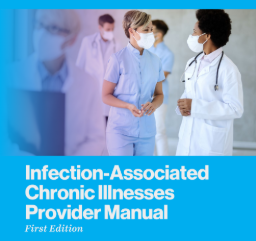Long COVID Resources for Providers
 The most comprehensive resource for the diagnosis and treatment of Long COVID is the Infection-Associated Chronic Illness Provider Manual published by the Cohn Center for Recovery From Complex Chronic Illness (CoRE). Clinically, Long COVID is usually indistinguishable from ME/CFS. The latest research indicates that 42%-60% of Long COVID Patients have ME/CFS. The CoRE manual identifies ten mechanisms of disease associated with Long COVID. These are:
The most comprehensive resource for the diagnosis and treatment of Long COVID is the Infection-Associated Chronic Illness Provider Manual published by the Cohn Center for Recovery From Complex Chronic Illness (CoRE). Clinically, Long COVID is usually indistinguishable from ME/CFS. The latest research indicates that 42%-60% of Long COVID Patients have ME/CFS. The CoRE manual identifies ten mechanisms of disease associated with Long COVID. These are:
- Pathogen persistence in tissue or host cells
- Pathogen reactivation under conditions of immune dysregulation
- Autonomic Dysfunction
- Coagulation and vascular dysfunction
- Microbiome imbalance
- Neuroinflamation and cognitive dysfunction
- Mitochondrial dysfuntion
- Immune dysfunction and autoimmunity
- Joint hypermobility
- Mast cell activation
ME/CFS, Persistent or Chronic Lyme disease, and other complex chronic illnesses all share these mechanisms of disease.
ICD Coding
Effective October 1, 2022, updates to the US ICD-10-CM will enable tracking of people with ME/CFS, including those who develop the disease following COVID. These updates are specific to the ICD-10-CM, the US version of the International Classification of Diseases.
- Coding Poster: Does Your Long COVID Patient have ME/CFS? (PDF)
- Updated Coding for ME/CFS following Long COVID (PDF)
Guidance for Clinical Care
- Clinical Care of Patients with ME/CFS (CDC)
- ME/CFS Essentials Of Diagnosis and Management (Mayo Clinic Proceedings, November 2021)
- US ME/CFS Clinician Coalition Testing Recommendations (PDF)
- US ME/CFS Clinician Coalition Treatment Recommendations (PDF)
- Helping Patients Access Disability and Accommodations (US ME/CFS Clinician Coalition; scroll to the bottom of the page)
Patients who have symptoms consistent with ME/CFS should be treated as ME/CFS patients, which includes guidance on energy management (e.g. pacing) and only a slow and carefully monitored re-introduction of exercise and resumption of normal activities. Additionally, the ICD-10 code for ME/CFS (G93.32) should be added to the clinical record.
- ME/CFS and Post-Exertional Malaise among Patients with Long COVID (March 2023)
- Diagnosing ME/CFS in People with Long COVID (PDF) (US ME/CFS Clinician Coalition Consensus Statement, April 2023)
AAPM&R consensus guidance statements
- Multidisciplinary collaborative consensus guidance statement on the assessment and treatment of fatigue in postacute sequelae of SARS-CoV-2 infection (PASC) patients
- Multi-disciplinary collaborative consensus guidance statement on the assessment and treatment of cognitive symptoms in patients with post-acute sequelae of SARS-CoV-2 infection (PASC)
- Multi-disciplinary collaborative consensus guidance statement on the assessment and treatment of breathing discomfort and respiratory sequelae in patients with post-acute sequelae of SARS-CoV-2 infection (PASC)
- Multi-Disciplinary Collaborative Consensus Guidance Statement on the Assessment and Treatment of Cardiovascular Complications in Patients with Post-Acute Sequelae of SARS-CoV-2 Infection (PASC) The full text of this article is currently available as a PDF.
ME/CFS and Long COVID in Children
- ME/CFS in Children (CDC)
- Long COVID in Children: What Do We Know? (November 2022)
- Myalgic Encephalomyelitis/Chronic Fatigue Syndrome Diagnosis and Management in Young People: A Primer (2017)
From the Patient’s Perspective
- “Long COVID Has Forced a Reckoning for One of Medicine’s Most Neglected Diseases” (PDF) (September 2022) Only a couple dozen doctors specialize in chronic fatigue syndrome (ME/CFS). Now their knowledge could be crucial to treating millions more patients.
- “One of Long COVID’s Worst Symptoms Is Also Its Most Misunderstood” (PDF) (about brain fog; September 2022)
- “Fatigue Can Shatter a Person” (PDF) (July 2023) Everyday tiredness is nothing like the depleted symptom that people with long COVID and ME/CFS experience.

